French conservatives seek deal with National Rally
FORMERLY THE NATIONAL FRONT
YOU CAN CHANGE THE NAME OF THE PARTY BUT YOU CAN'T CHANGE THE FACT THEY ARE FASCISTS
James Crisp
Tue, June 11, 2024
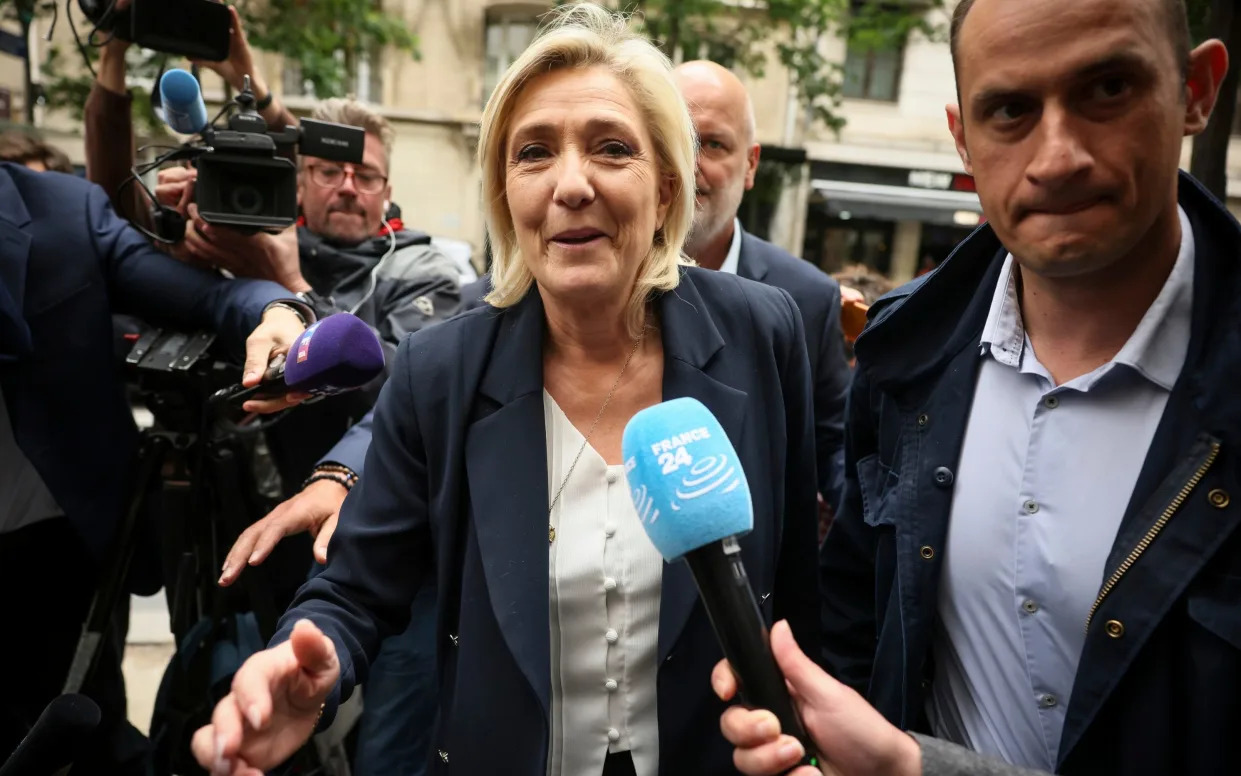
Marine Le Pen's anti-immigration party is expected to emerge as the strongest force after Emmanuel Macron called snap elections - Thomas Padilla/PA
France’s mainstream conservative party signalled the end of a decades-long ban on working with the hard-Right as its leader sought an alliance with Marine Le Pen ahead of snap elections.
Eric Ciotti, the leader of the Republicans, suggested the party should work with Ms Le Pen’s National Rally (RN) to win a Right-wing majority in the French parliament in the vote later this month.
Emmanuel Macron called the snap election on Sunday after suffering a humiliating defeat to RN in the European elections.
Mr Ciotti faced a fierce backlash, with several MPs quitting his party in protest at his willingness to end the so-called “cordon sanitaire”, in which mainstream parties co-operate to keep the hard-Right out of power.
The Republican leader said he was willing to enter a government with Ms Le Pen, insisting their parties “say the same things” adding that any opposition between them was “imagined”.
“This is what the vast majority of our voters want. They tell us ‘reach a deal,’” he said
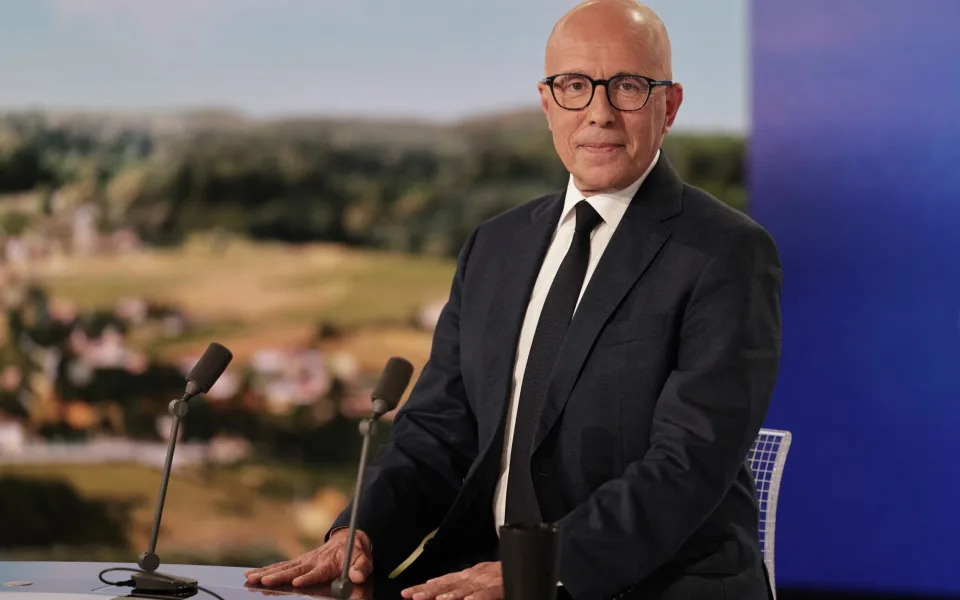
Eric Ciotti, leader of the Republicans, said 'the majority of our voters' want a Right-wing alliance - STEPHANE DE SAKUTIN/POOL/AFP/Getty Images
An alliance with the Republicans could help the anti-migrant and Eurosceptic National Rally to a majority in the National Assembly after two rounds of voting on June 30 and July 7.
National Rally, which is expected to win the snap vote, is looking for allies in case it fails to reach an absolute majority, which would mean it could name the prime minister and make Mr Macron a lame duck.
Mrs Le Pen’s party welcomed Mr Ciotti’s offer but it risks destabilising LR, which was in power for large periods of French history.
Philippe Gosselin, a Republicans MP, said he would quit rather than work with the National Rally.
“It is unthinkable for me [and many Republicans MPs] that there could be the slightest agreement, the slightest alliance,” Mr Gosselin said.
An LR parliamentary source estimated that only about a sixth of Republicans lawmakers would accept such a deal.
“What Eric Ciotti is saying is valid only for himself, he must leave the leadership of the Republicans,” Olivier Marleix, who heads the Republicans group of the lower house of parliament, said.
The Republicans, the heirs of Charles de Gaulle and Jacques Chirac’s parties, is a shadow of its former self with far fewer Assembly MPs than National Rally.
Senior figures have already deserted the party to join Mr Macron’s centrists, which also gutted support for the centre-Left socialist. Others have joined Ms Le Pen.
Mr Macron’s camp said that Mr Ciotti’s comments were shameful. They were reminiscent of the 1938 Munich Agreement signed by France and Britain with Nazi Germany, said Gérald Darmanin, interior minister, and a former LR member.
National Rally would win 235 to 265 seats in the National Assembly according to current polling. It is a huge jump from its current 88 but short of the 289 needed for an absolute majority, according to the survey by Toluna Harris Interactive for Challenges, M6 and RTL published Monday.
The same poll has LR with 40-55 seats, so the two combined are not guaranteed to gain an absolute majority.
All French political parties have been rushing to find alliances since Mr Macron called snap elections, which led to a drop in the value of the euro, French stocks and bonds.
Divided Left-wing parties have pledged to work together and nominate joint candidates in the elections, but are yet to strike a formal deal.
Mr Macron has said he is in the election to win it and that calling it “was the right decision, in the interest of the country”.
He has ruled out resigning even if his party loses the vote.
France's conservative leader: Want to form "alliance" with Le Pen's National Rally
Reuters
Tue, June 11, 2024
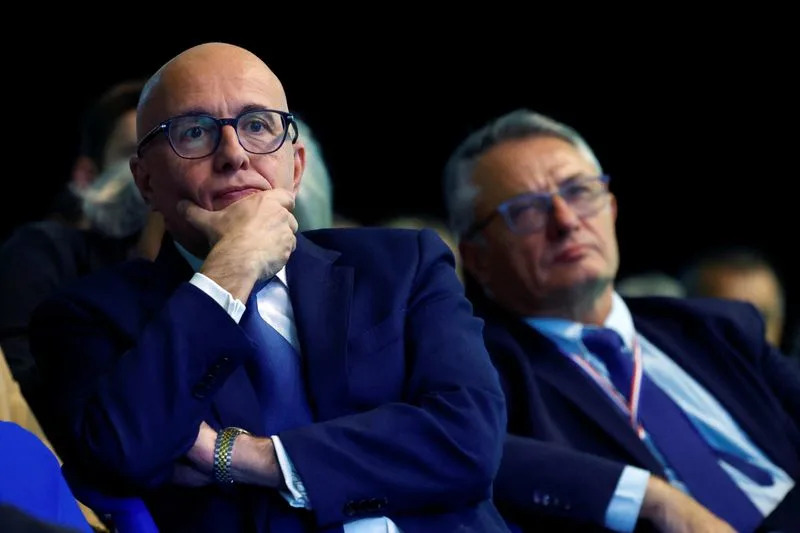
The 105th session of the Congress of Mayors in Paris
PARIS (Reuters) -France's conservative Republicans party chairman Eric Ciotti on Tuesday called for a country-wide alliance between his party's candidates and Marine Le Pen's far-right National Rally (RN) in forthcoming parliamentary elections.
"We say the same things so let's stop making up imagined opposition", Ciotti told TF1 television.
Ciotti spoke to RN party leaders Le Pen and Jordan Bardella before announcing the move, which he said was aimed at ensuring the Republicans (LR) can secure enough seats to still form a parliamentary group.
"We need some sort of alliance and that's what I am offering", Ciotti said. He added: "This is what the vast majority of voters wants."
The call from Ciotti, who hails from the more conservative branch of LR, may drive a wedge through the party. More centrist members of the party have already said they would not countenance such a move.
Olivier Marleix, LR's chief in the lower house of parliament, said he would not support "any arrangement" with a far-right movement.
Marleix demanded Ciotti's resignation.
National Rally is widely expected to emerge as the strongest force after snap elections starting in three weeks, although the party may fall short of an absolute majority.
(Reporting by Tassilo Hummel; editing by Richard Lough)
How Jordan Bardella has helped give the far right an acceptable face in France
Saskya Vandoorne, CNN
Tue, June 11, 2024
At just 28 years old, Jordan Bardella has led the French far right to a landslide victory and humiliated President Emmanuel Macron’s camp in the European Parliament elections. He’s poised to become the next prime minister if the French president loses his gamble in the upcoming snap election. But who is far-right doyenne Marine Le Pen’s slick protégé?
Bardella, the National Rally party leader, grew up an only child in social housing in Seine-Saint-Denis, a working-class suburb in the northeast of Paris. He joined the far-right party at 16 and then briefly attended the prestigious Sorbonne university in the French capital before dropping out.
“Like many families, many people who live in these neighborhoods, I was confronted with violence, and my mother struggled to make ends meet. The truth is that the sense of urgency that led me into politics has never left me,” Bardella told public television channel France 2 in April.
In clinching 31% of the vote in the European parliamentary election – a record score for the National Rally – he trounced Macron’s centrist party by a wide margin.
“A wind of hope is sweeping across France and it’s only just the beginning,” he said Sunday, as he urged Macron to call a national election – a bluff the president called, with the first round of voting to take place June 30.
Le Pen handpicked the young politician to head the party in 2022 – ending a 50-year-rule by the Le Pen dynasty – and bring a fresh boost to the French populist right.
Hailed as the answer to the National Rally’s attempts to detoxify the party and attract a younger crowd, he helped distance the party from its founder and Marine’s father, 95-year-old Holocaust-denier Jean-Marie Le Pen. While Bardella continues to try to rid the party of its antisemitic and racist overtones, the populist rhetoric remains much the same.
“We will act by expelling delinquents, criminals and foreign Islamists who pose a threat to national security,” Bardella said, as he campaigned on promises of limiting free movement of migrants and threats of mass expulsions.
Entrenched in the mainstream
Bardella’s popularity is proof that what was once unpalatable and reserved to the fringes of French politics is now normalized and entrenched in the mainstream. Voting for the far right is no longer something to be ashamed of in much of France. He appeals to the working class, the unemployed and young people in rural areas.
On Sunday, 32% of people aged between 18-34 voted for him compared to 5% for the candidate representing Macron’s party, according to an Elabe poll for BFMTV.
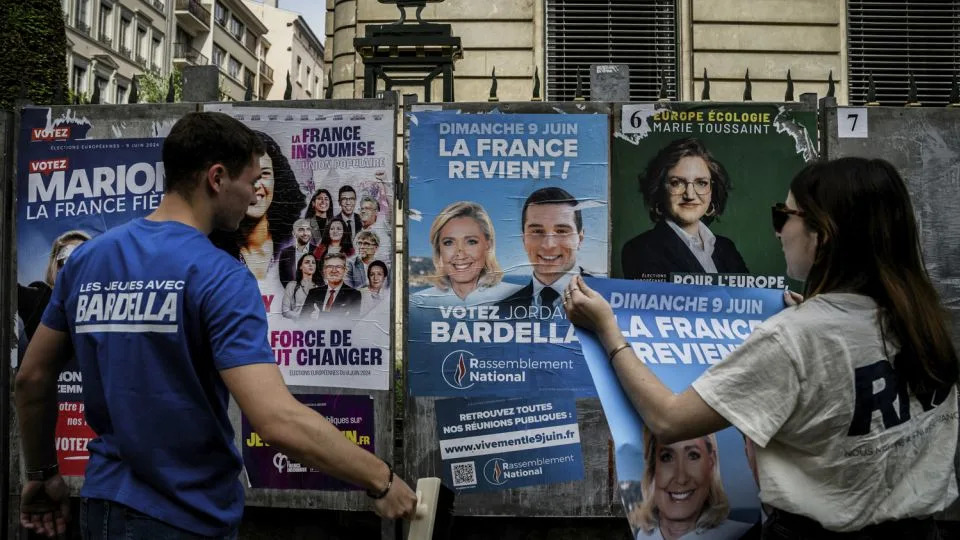
National Rally volunteers paste up campaign posters ahead of last weekend's elections. - Jeff Pachoud/AFP/Getty Images
According to political analyst Dominique Moisi, Bardella has galvanized a new generation of voters who worry about the future, particularly as regards jobs and the cost of living, and who believe France has an “identity crisis.”
“They (the youth) think the world is too dangerous and they say we don’t want to be inundated by migrants coming from the Middle East or Africa. We want to be at home,” said Moisi.
TikTok charm offensive
The selfie-taking, clean-shaven Bardella has led a successful charm offensive on TikTok with videos of him wine tasting and doing shots. Even something as banal as him eating a cereal bar racks up thousands of views.
His carefully curated social media presence makes him seem familiar and relatable to his 1.5 million followers. He’s known for his videos with brutal put-downs, such as drinking a beer with a caption reading “drinking the tears of Macron fans.”
Far-left figurehead Jean-Luc Mélenchon has accused Bardella of being all bluster and no substance. “What does Mr. Bardella want? We don’t know. He says nothing. He’s a good-looking guy, but what’s his program? Throwing immigrants into the sea.”
Critics also point to Bardella’s short career and lack of concrete experience as well as his many absences from the European parliament, to which he was first elected in 2019.
Despite his inexperience, Bardella’s ability to rally people behind him was evident this week when Eric Ciotti, the head of The Republicans, France’s traditional right-wing party, announced a surprise coalition with the National Rally for the upcoming legislative elections. The move was immediately attacked by senior members of Ciotti’s own party while Marine Le Pen welcomed the announcement calling it “a brave choice.”
Effective political match
Bardella – who dated Le Pen’s niece – has said the two politicians have a very trusting relationship.
“I’m a loyal, well-behaved boy and I’ll always be her first supporter,” he said.
Le Pen, a self-described Bardella groupie, has said she’s always been a great admirer of his and that he shows great maturity.
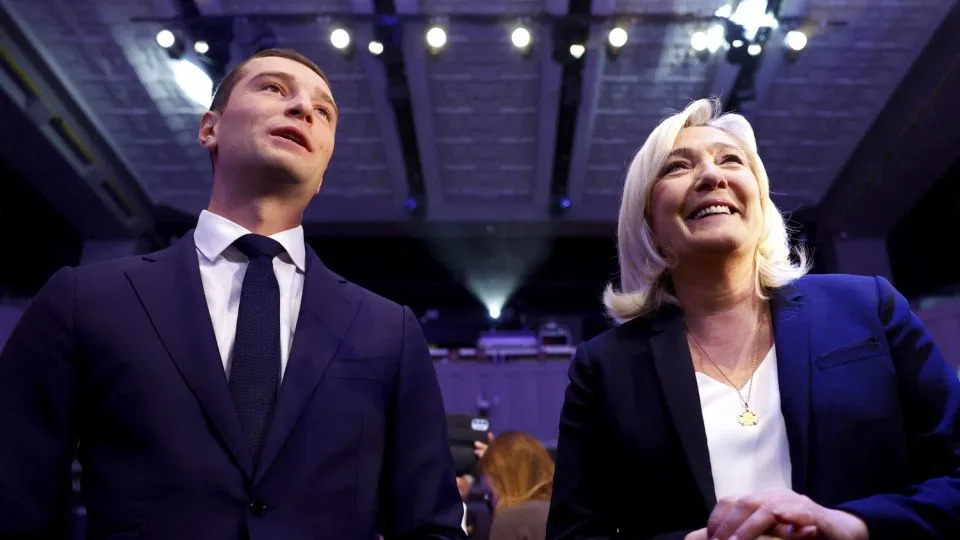
Bardella and Le Pen attend the National Rally party's Congress in Paris, France, November 5, 2022. - Christian Hartmann/Reuters
The 55-year-old has run for president three times since 2012, made it into the final runoff for the past two, and is largely expected to be a candidate in the next presidential election in 2027.
The young Bardella’s electoral success in the European elections look set to help boost that ambition.
These two deeply political animals, one a fixture of French political life, the other an up-and-coming disruptor of it, appear to have found in each other a remarkably efficient political match. It’s one that threatens to bring a party long considered too far to the right to be electable to power.
CNN’s Emma Leyo contributed reporting.
Angela Skujins
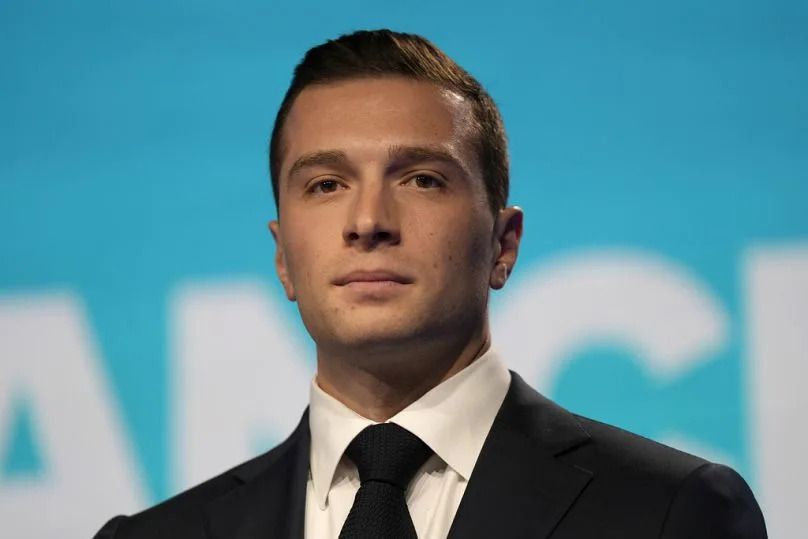
Jordan Bardella, president of the French far-right National Rally, is seen at the party election night headquarters on Sunday, June 9, 2024 in Paris, France. - AP
Two years later, he dropped out of a geography course to devote himself to politics and served consecutively as a regional councillor, spokesperson, and vice-president of the party. He then led NR’s list in the 2019 European elections at just 23 years old.
In November 2022, he was elected successor of Le Pen as the president of the far-right party. The following year, he was appointed, for the second consecutive time, as the party’s lead candidate — and is expected to remain at the helm for many years.
Bardella's meticulously crafted narrative has contributed to refining the image of the RN, a party once helmed by Jean-Marie Le Pen from a chateau nestled in an affluent suburb west of the capital.
In his own words, he uses TikTok — where he boasts more than a million followers — as a means "to reach out to young people who are depoliticised and become politicised through social media".
The NR's lead candidate for the EU elections, Bardella, campaigned to limit the free movement of migrants by carrying out national border controls and dialling back EU climate rules.
The party no longer wants to leave the EU and the eurozone but aims to weaken them from within. Accused in a television debate before the elections of bringing about the end of the EU, Bardella countered, "I am not against Europe. I am against the way Europe works."
Aiming for a significant powerbroking position in Europe following the elections, Bardella has distanced his party from the German ally Alternative for Germany (AfD), declaring that it will no longer align with the faction in the European Parliament after a series of controversies.
French right uproar over call for far-right alliance
Paul Kirby - BBC News
Tue, June 11, 2024
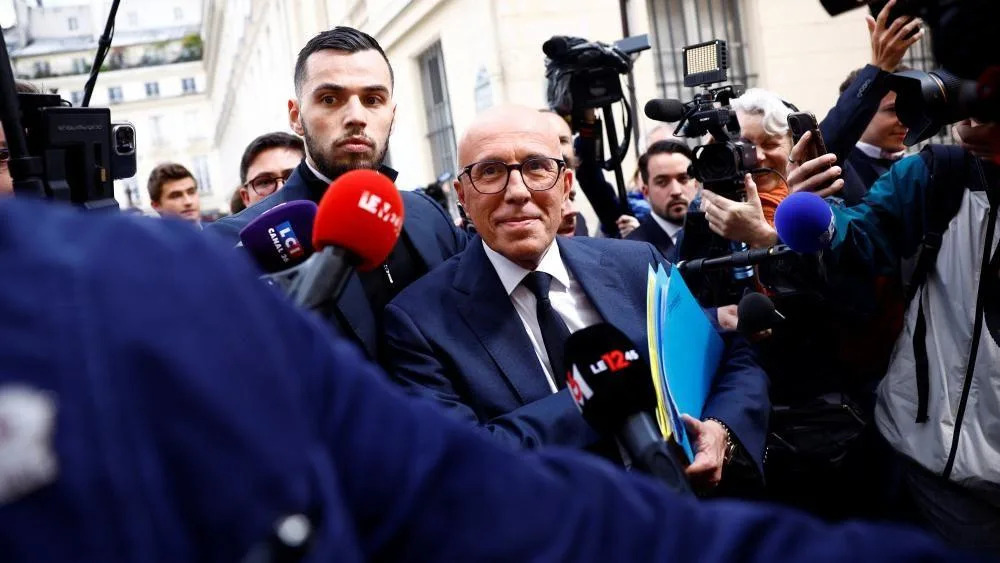
[REUTERS/Sarah Meyssonnier]
The leader of France's right-wing Republicans party, Eric Ciotti, has sparked an outcry after he backed an alliance with the far-right National Rally in snap elections announced by President Emmanuel Macron.
The anti-immigration party of Marine Le Pen and Jordan Bardella scored a dramatic victory in European elections on Sunday, prompting Mr Macron to dissolve parliament and call a first round of elections in 19 days' time.
The decision has sent shockwaves through French politics, not least among the Republicans party, which won only 7.25% of the vote and has seen many of its voters move to National Rally (RN).
For Republicans leader Eric Ciotti the solution was clear: "We need to have an alliance while remaining ourselves... an alliance with the National Rally and its candidates."
The snap election has prompted parties on both left and right to consider forming alliances to stand a greater chance of winning more seats. Left-wing parties have already agreed to abandon their differences to form a "popular front".
But never before has the traditional right in French politics made any sort of political accord with the far right and Mr Ciotti's remarks set a party that was already struggling to find a voice "on the verge of implosion", as Le Monde put it.
Mr Ciotti, who is on the right wing of his party, revealed he had already spoken to Marine Le Pen and Jordan Bardella. Ms Le Pen immediately praised his "courageous choice and sense of responsibility" and looked forward to an end to "40 years of a pseudo-cordon sanitaire" disappearing.
But his suggestion was immediately greeted with a chorus of derision. Outside party headquarters in Paris, supporters spoke of an act of treachery for a party whose origins lie with the first president of France's current Fifth Republic, Charles de Gaulle.
A clearly furious Republicans vice-president Florence Portelli said the party would fire Mr Ciotti for suggesting an accord with the far right. "I think there's a chance he can be made to leave, if he doesn't go by himself, and I have no doubt it'll happen," she told France Info TV.
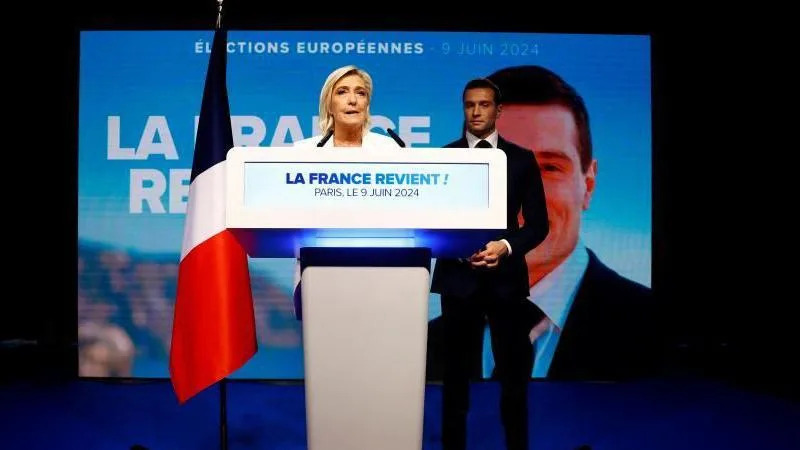
Marine Le Pen and Jordan Bardella say they are ready to exercise power [ REUTERS/Sarah Meyssonnier]
Senate Republicans leader Bruno Retailleau accused him of disloyalty: "The Republicans will never form an alliance with the RN, we have deep ideological differences and we have to maintain our independence and integrity."
Many of Mr Ciotti's critics said he was driven by local politics in his home city of Nice. One MP, Vincent Descœur, said he was resigning in protest and another, Jean-Yves Bony, said he would too if Mr Ciotti didn't step down in 48 hours.
François-Xavier Bellamy, who led the Republicans in the European elections, said working with RN would merely be doing Mr Macron's work for him.
President Macron has explained his bombshell decision to call elections, saying he could not carry on after the European elections as if nothing had happened and did not want to come across as powerless.
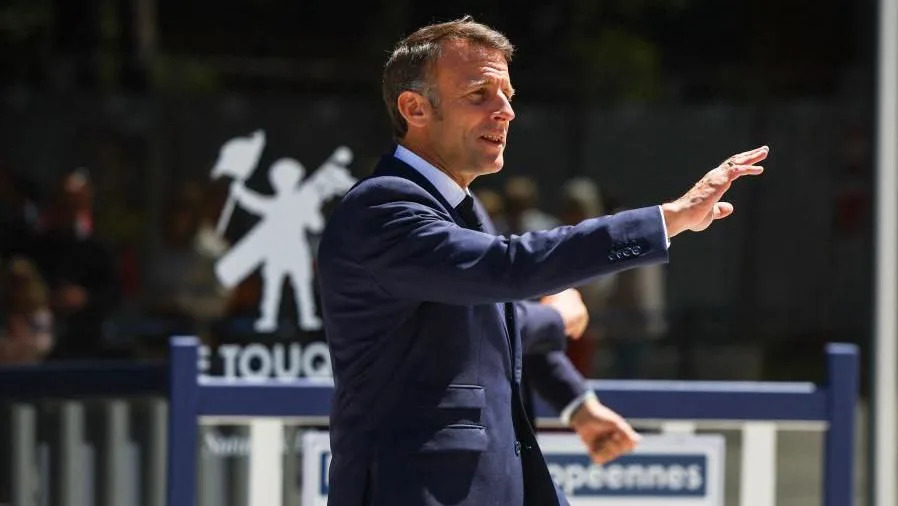
[REUTERS/Hannah McKay/Pool]
He ruled out resigning as president "whatever the result" of the elections, which take place over two rounds on 30 June and 7 July, less than three weeks before the Paris Olympics.
"It's not the RN who write the constitution, or the spirit of it," he told Le Figaro.
National Rally won 31.4% of the vote on Sunday, more than double the 14.6% of Mr Macron's Renew alliance, while a resurgent centre left, led by Raphaël Glucksmann, reached 13.8%.
Another far-right party, Reconquest, took 5% of the vote, and there had been talk of the two parties forming an alliance for the next election.
But Marion Maréchal of Reconquest, who is Marine Le Pen's niece, said RN had decided against an alliance because they wanted nothing to do with her party's leader Eric Zemmour.
Macron snap election leaves rivals stunned after EU vote
Europe's night of election drama capped by Macron bombshell
Macron takes huge risk with surprise election
At the last parliamentary election, France's notoriously divided left-wing parties formed a group called Nupes, bringing together the Socialists, far-left France Unbowed (LF), Communists and Greens.
Despite Nupes imploding amid even wider divisions over issues such as the war in Gaza, the left parties have agreed to form a pact to fight the new elections.
Although Mr Macron won a second term two years ago, his party failed to secure a majority in parliament, making it a struggle to pass legislation.
He has often had to rely on support from the Republicans to do so, so his decision to call elections is a big risk, especially when he is facing defeat.
The first opinion poll taken since Sunday's elections suggests National Rally would win 34% of the vote, ahead of 19% for Mr Macron's party.
But until now the two rounds of a parliamentary election have been tricky for National Rally as they have often struggled to win more than 50% of second-round run-off votes because their opponents tend to coalesce against the far right.
It is so far unclear whether their dramatic success on Sunday may have changed that.
Le Pen and Bardella: France's far-right double act zero in on power
Gabriel Stargardter
Mon, June 10, 2024
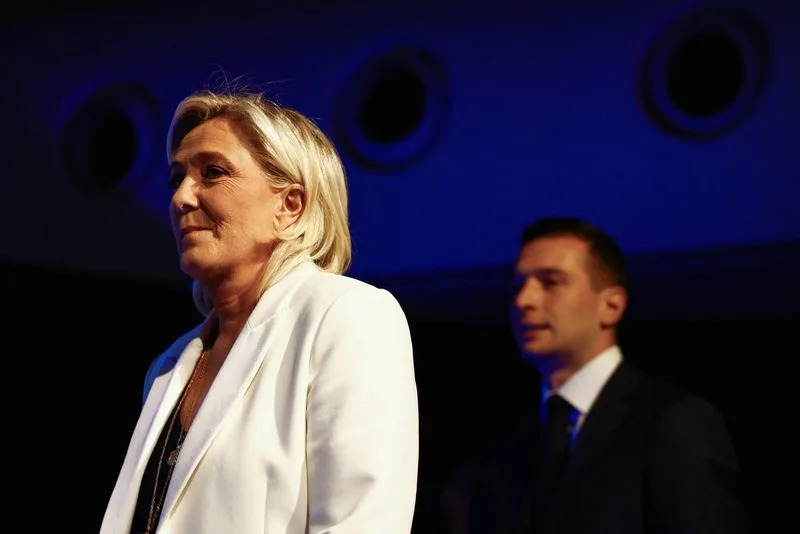
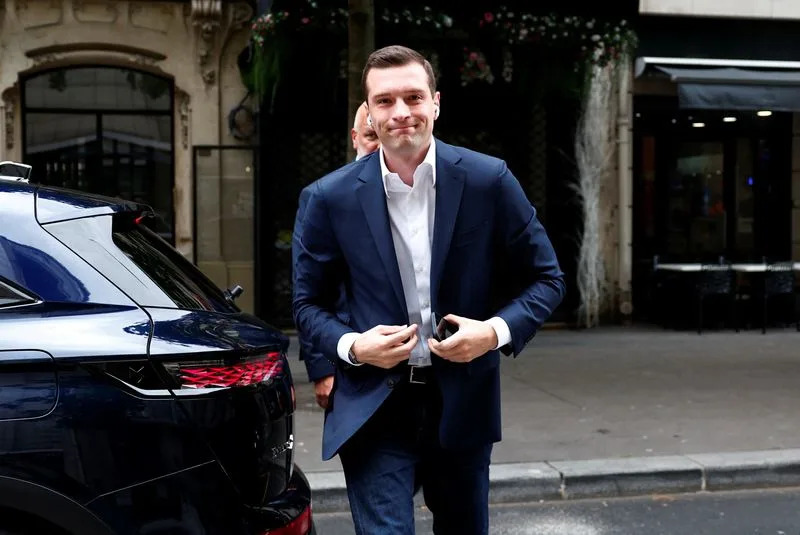
Bardella speaks after the polls closed during the European Parliament elections, in Paris
By Gabriel Stargardter
PARIS (Reuters) - In a glossy video released days before the European Parliament elections, France's far-right double act appeared side by side in brilliant white shirts to deliver their final address.
"Do your patriotic duty," said Marine Le Pen, the leading figure of the National Rally (RN) party and de facto frontrunner for the 2027 presidential election. "I ask you to go to vote for Jordan Bardella. Offer France the most beautiful victory."
The video has notched nearly 5 million views since it was posted on Bardella's wildly popular TikTok account two days ago. It's part of a slick political rebrand, overseen by Le Pen and her 28-year-old party president Bardella, that has allowed the RN to shed its racist reputation as the former National Front, and storm to victory in Sunday's vote.
The RN's strong showing, which forced Macron into calling a snap legislative election that could finally hand the far right real power in France, is partly due to the formidable political tag team that Bardella and Le Pen have formed, experts said. They have fused youthful enthusiasm with battle-hardened experience to devastating electoral effect.
"They're very complementary," said Philippe Marliere, a French politics professor at University College London.
The sharp-suited Bardella, son of an Italian immigrant mother who grew up in the rough outskirts of Paris, has polished the RN's reputation, Marliere said. Bardella also broadened its appeal by attracting younger, blue-collar voters hit by inflation and job insecurity to a party once known for an older, middle-class and arch-conservative clientele, he added.
The RN won in every major age group in Sunday's election, except among the over-65s, where it was tied with Macron's ticket, according to a BFM TV exit poll.
Overall, the RN won 31.37% of the vote, the official tally showed, more than double the Macron coalition's 14.6%.
Emile Chabal, professor of contemporary history at the University of Edinburgh, said Bardella and Le Pen had detoxified the RN by retooling it as the party of the working class.
"While they have retained many aspects of the party's DNA - especially its anti-immigration policies and a hostility to Islam - they have managed to wrap these up in a protectionist language ... (that) appeals particularly to a younger middle-aged demographic," he said. "In 2024, the RN can fairly lay claim to being the party of the French working classes."
Bardella will be the party's candidate for prime minister in the upcoming early election to be held on June 30 and July 7, RN deputy chairman Sebastien Chenu said on RTL Radio on Monday.
On his TikTok account, where he has 1.5 million followers, Bardella often posts videos of himself with adoring young fans. In acerbic TV appearances, he has distinguished himself as Le Pen's clean-cut attack dog, Marliere said.
"It's a convenient arrangement for political purposes to let Marine Le Pen fully concentrate on the big prize, the (2027) presidential election," he said.
However, alongside his pugnacious media presence, Bardella has often let himself down with unforced errors and gaps on the nitty gritty of policy, Marliere said. Le Pen might fret that as prime minister, Bardella's inexperience could lead to charges of incompetence, potentially dooming her 2027 chances, he added.
And even before the snap vote, Bardella is likely to face a grilling on issues outside his comfort zone, especially on economic policy and Ukraine, a source close to Macron said.
"For legislative elections, he will be more exposed," the source said. "He will be asked: Who do you name for finance minister? What do you do for your first 100 days?"
Alternatively, if Bardella shines, Le Pen, 55, may fear being eclipsed by her young protege.
"If he looks more appealing or successful, there might be attempts to make him the 2027 presidential candidate," said Sudhir Hazareesingh, a French politics expert at Oxford University, especially as Le Pen has already lost three presidential elections, two of them to Macron.
"But Bardella is still very young so he can afford to wait a little, and let her fail rather than look too ambitious."
(Reporting by Gabriel Stargardter; additional reporting by Michel Rose; editing by Mark Heinrich)
National Rally to woo other right-wingers ahead of French snap poll
DPA
Mon, June 10, 2024
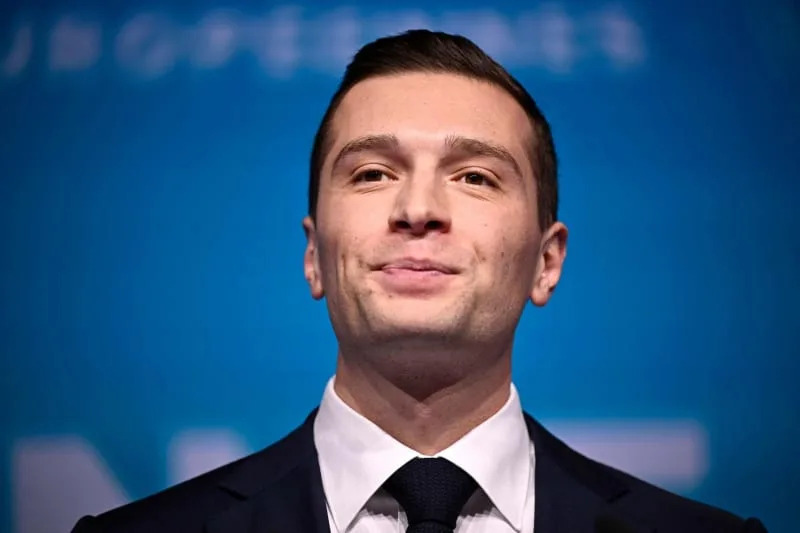
French far-right Rassemblement National (RN) party president Jordan Bardella smiles as he addresses militants after the first results announcement during an evening gathering of French far-right party Rassemblement National (RN) on the final day of the European Parliament election, at the Pavillon Chesnaie du Roy in Paris. Julien De Rosa/AFP/dpa
Following its win in the European elections, France's right-wing populist National Rally (RN) wants to woo other right-wingers, including from the far-right Reconquest party, for the snap parliamentary elections called by President Emmanuel Macron.
"I myself am perfectly willing to discuss with personalities who do not come from the National Rally and who share the ambition to bring some of our ideas to power in a few weeks and - also within the framework of a cohabitation - to initiate the reconstruction of the country," RN party leader Jordan Bardella said on Monday evening in Paris.
In France, cohabitation means that the president and the prime minister represent different political directions.
Bardella had his first meeting on Monday with Reconquest's lead candidate for the European elections, Marion Maréchal.
"I wanted to have a chat with her and talk about our current endeavours to form the broadest possible majority," Bardella said, adding that his party wanted to run with other right-wing parties as a national union in the parliamentary elections with the aim of taking over the government and the office of prime minister.
No agreements have yet been reached with Maréchal, he said: "At the moment, it's all about discussions."
National Rally received 31.36% of the vote in the European elections, while Reconquest achieved 5.47%.
Maréchal is the niece of National Rally's parliamentary party leader Marine Le Pen and used to be active in her party before switching to the far-right rival party a good two years ago.
"It seems obvious to me that the 1 million voters of Reconquest must participate in this momentum around the RN," Maréchal said after an initial discussion with Bardella and her aunt.
National Rally would like "to work with those in Reconquest who have taken a constructive stance towards the RN."
Reconquest leader Éric Zemmour, who is at loggerheads with National Rally, could be an obstacle to a right-wing alliance. French media are also speculating about a return of Maréchal to National Rally.
France goes into election campaign mode
France swiftly entered election campaign mode within 24 hours of the stunning electoral victory for National Rally.
President Emmanuel Macron dissolved the National Assembly, France's lower house of parliament, on Sunday after the scope of the far-right victory became clear and and scheduled parliamentary elections in just a few weeks' time.
Various parties are strategizing their campaigns in response to the sudden electoral call.
Macron's job as president is not at stake in the upcoming elections, as the next presidential election is not scheduled until 2027.
Government under pressure for a long time
His aim is to create a more stable majority in parliament for his remaining term of office. He will be hoping that citizens in France will not vote the same way in national elections as they did in the European Parliament elections, and that the snap election will break Le Pen's momentum.
While Macron enjoys a prominent role on the international stage, his governing camp has been struggling domestically for two years as his faction has not had an absolute majority in the National Assembly.
This has forced his camp to navigate a contentious and combative legislative environment, often resorting to heavy-handed tactics and bypassing votes in order to implement their plans.
The threat of a vote of no confidence this autumn has loomed over the government for some time, adding to the challenges of governing.
Consequences for Germany and Europe
Macron's snap election call is a big gamble. If it fails, it could have serious repercussions for Germany and Europe. Observers say the French president could lose substantial influence, making it difficult for him to advance his foreign policy agenda.
France could descend into a chaotic domestic political situation, compromising its reliability as an international partner.
However, if Macron manages to secure a more stable majority, it would benefit international partners as he would no longer be preoccupied with quelling domestic political unrest.
This marks the first dissolution of the French National Assembly in over 25 years, a significant move in France's recent political history.
EU vote results as catalyst for snap polls
National Rally secured 31.36% of the European vote, according to preliminary results announced by the Interior Ministry on Monday after all the votes had been counted.
Macron's camp came a distant second with 14.6%, followed by the Socialists with 13.83%.
The eurosceptic National Rally - which used to be called the National Front until six years ago - has softened its image in recent years in an effort to widen its appeal and strengthen Le Pen's bid for the presidency.
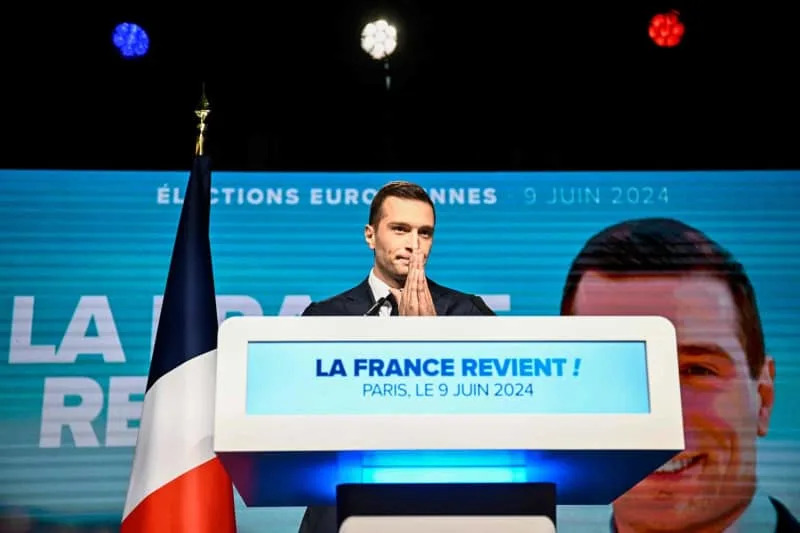
French far-right Rassemblement National (RN) party president Jordan Bardella addresses militants after the first results announcement during an evening gathering of French far-right party Rassemblement National (RN) on the final day of the European Parliament election, at the Pavillon Chesnaie du Roy in Paris. Julien De
Joseph Ataman and Saskya Vandoorne, CNN
Mon, June 10, 2024
It was a stinging blow and a shocking parry.
French President Emmanuel Macron saw his party fall into second place in European Parliament elections in France on Sunday, with the two main far-right parties together taking close to 40% of the vote.
When Jordan Bardella, the leader of the far-right National Rally party, called on Macron to dissolve the French national parliament on Sunday night, it seemed like political posturing, riding high on his victory in European polls.
“The President of the Republic cannot remain deaf to the message sent by the French this evening,” he told supporters.
Macron called his bluff.
Announcing a snap national election for the end of June, Macron has set up a showdown between his pro-European, centrist and pro-Ukrainian ideals and the anti-immigration, populist and hard-line law-and-order rhetoric of the far right.
“The extreme right is both the impoverishment of the French and the downgrading of our country. So, at the end of this day, I cannot act as if nothing had happened,” he told the country in a televised address Sunday.
Calling the far right’s bluff
Macron will try to rally the right and left, urging their supporters to come together and vote against the far right, but there’s no knowing if it’ll pay off.
The first round of voting will take place in 20 days, a tiny window in which to form a coalition from the mosaic of France’s centrist and left-wing parties.
There appears to be little appetite to join forces with Macron on the left, bruised after years of largely fruitless protests against his pro-business agenda, and torn apart from the inside by divisions over the war in Gaza.
The last time a French president dissolved the country’s lower house, the National Assembly, was in 1997. Jacques Chirac lost his majority, and the left came to power.
In an interview Monday morning, French Foreign Minister Stephane Séjourné said that Macron’s Renaissance party was open to withholding candidates from contesting the seats of potential allies in other parties.
Séjourné told Radio France that the party would discuss such a move with “reasonable people with whom we can work.”
On Sunday night, the popular French far-left party France Unbowed (LFI) appeared to have already ruled itself out of such a move.
“It is now clear that the country wants to turn the page on the Macron era. And this page must not be turned with the National Rally and the far right,” Manon Aubry, leader of the LFI European list, which came fourth in the European vote in France, told supporters.
LFI figurehead Jean-Luc Mélenchon said that he saw no reason to unite with other parties on the left, especially with the narrow window to form a coalition.
Such a proposition by Macron’s party is no doubt a sign of weakness, a far cry from Macron’s 2017 landslide second-round victory over far-right presidential candidate Marine Le Pen – and a sign of the times, his party wounded by memories of the “yellow vest” protests, an unyielding Covid-19 regime, and unpopular pension reforms.
Since parliamentary elections held at the beginning of his second term in 2022, Macron has been ruling without an absolute majority in parliament, ordinarily unable to pass bills with his lawmakers alone.
Instead, he invoked article 49.3 of the constitution several times to push legislation through parliament without a vote.
This has stoked yet more anger against Macron and further division in France, especially given the contentious nature of his hike in the pension age to 64.
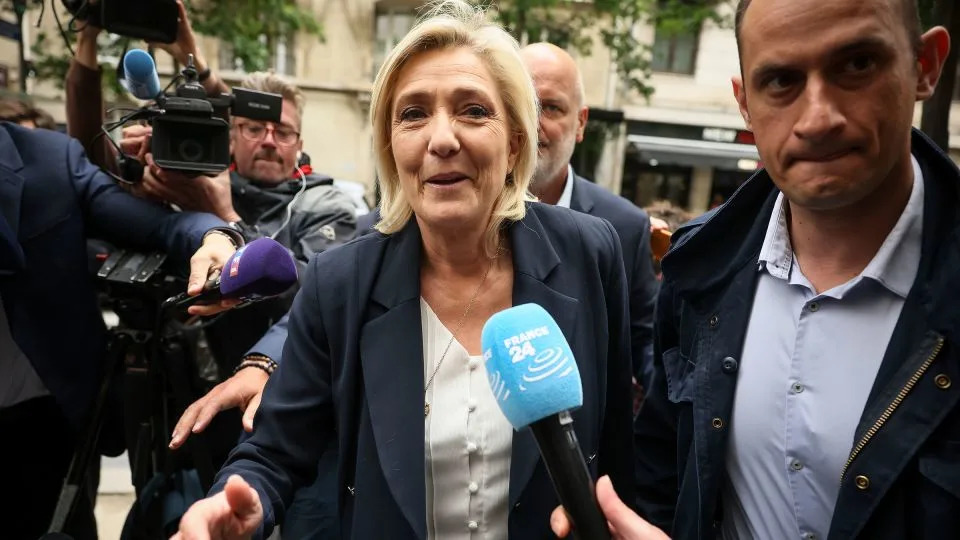
French far-right leader Marine Le Pen arrives at the National Rally party headquarters on Monday, June 10, 2024 in Paris. - Thomas Padilla/AP
Dueling visions
The far-right National Rally, spearheaded by Le Pen, the long-time doyenne of France’s anti-immigration camp, currently holds 88 to Macron’s bloc’s 250 seats in the 577-seat French parliament and, in theory, the upcoming election is far from a two-horse race.
The appeal of the far-right’s anti-immigration stance is no doubt magnified on the European stage – where EU lawmakers have long struggled to stem illegal immigration flows.
At a national level, Bardella and Le Pen will have to rely on a broader spectrum of policies, doing battle with Macron’s economic record, which has mostly shielded France from the inflation woes suffered by Europe.
However, it’s clear that this election will be a duel between Macron and Le Pen.
French Finance Minister Bruno Le Maire admitted Monday morning that his party held some responsibility for Sunday’s results. He made his objective for the campaign clear.
“This will be project against project; National Rally against ours,” he told French radio network RTL.
The French foreign minister described the call for elections as a “bet of confidence” in the French people by Macron, with the president trusting they will hold the line against political extremes.
France’s voting system plays in Macron’s favor.
In the first round of ballots, a variety of parties will compete to meet a minimum threshold of votes.
The second round on July 7 will see the highest-polling candidates in each seat run off if no one wins an absolute majority. This could see voters of different stripes banding together to oppose a candidate from the far right.
This mechanism also applies to the presidential election, which has ensured no far-right victory at the Elysee Palace thus far.
On a more local scale, it may not be such a security.
Ultimately, the June 30 and July 7 votes will determine how Macron spends his last three years in power.
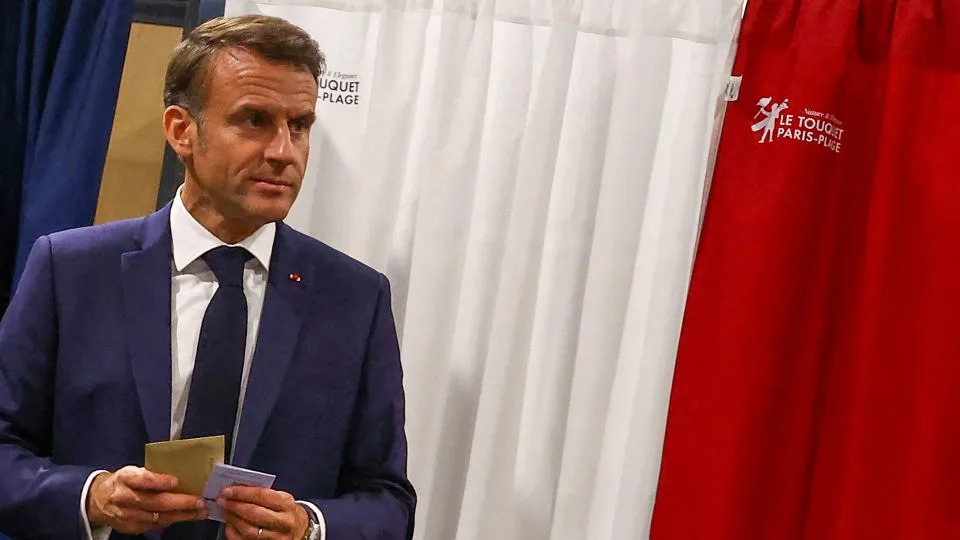
France's President Emmanuel Macron is seen before casting his ballot for the European Parliament election at a polling station in Le Touquet, northern France, on June 9, 2024. - Hannah McKay/Pool/AFP/Getty Images
What comes next?
What’s certain is that Macron – with a presidential mandate until 2027 - will remain president no matter what.
If his gamble pays off and he wins back a majority in parliament, he’ll be able to move ahead with reforms and govern as he likes: changes to end-of-life care and the education system are in his crosshairs. It’ll give him precious breathing space and a clear mandate for his agenda at home and abroad. In his words, “It’s a time of indispensable clarification.”
“The rise of nationalists and demagogues is a danger not only for our nation, but also for our Europe and for France’s place in Europe and the world,” Macron said Sunday in his address to the nation.
But the prospect of a lame-duck presidency looms large.
If his bloc, currently with 250 of the 577 MPs in the National Assembly, fails to meet the 289-seat threshold for an absolute majority but remains the largest, his government will again have to wage legislative battle with one hand tied behind its back.
If his nightmare comes true and the far-right movement replicates its European results on the national stage, he will be forced to appoint a prime minister from its ranks – most likely the 28-year-old Bardella, current president of National Rally.
In a “cohabitation,” Macron would deal with international and defense issues, while Bardella would hold sway over the domestic agenda.
Party figurehead Le Pen would likely wait in the wings to contest the 2027 president election against Macron’s successor. The constitution prevents him running for a third term.
“We are ready to be in power,” she said in her Sunday night victory speech.
In a country increasingly polarized by populist rhetoric, Yaël Braun-Pivet, speaker of France’s National Assembly struck a lonely note Monday morning as she called for greater cross-party cooperation.
“In France we don’t manage to get past partisan quarrels,” she said in an interview with broadcaster France 2.
Macron’s reputation has been founded on bold, political moves.
But if he fails to hold back the far-right this month in the coming weeks, his legacy will be the gamble that let the far right into power.
Saskya Vandoorne, CNN
Tue, June 11, 2024
At just 28 years old, Jordan Bardella has led the French far right to a landslide victory and humiliated President Emmanuel Macron’s camp in the European Parliament elections. He’s poised to become the next prime minister if the French president loses his gamble in the upcoming snap election. But who is far-right doyenne Marine Le Pen’s slick protégé?
Bardella, the National Rally party leader, grew up an only child in social housing in Seine-Saint-Denis, a working-class suburb in the northeast of Paris. He joined the far-right party at 16 and then briefly attended the prestigious Sorbonne university in the French capital before dropping out.
“Like many families, many people who live in these neighborhoods, I was confronted with violence, and my mother struggled to make ends meet. The truth is that the sense of urgency that led me into politics has never left me,” Bardella told public television channel France 2 in April.
In clinching 31% of the vote in the European parliamentary election – a record score for the National Rally – he trounced Macron’s centrist party by a wide margin.
“A wind of hope is sweeping across France and it’s only just the beginning,” he said Sunday, as he urged Macron to call a national election – a bluff the president called, with the first round of voting to take place June 30.
Le Pen handpicked the young politician to head the party in 2022 – ending a 50-year-rule by the Le Pen dynasty – and bring a fresh boost to the French populist right.
Hailed as the answer to the National Rally’s attempts to detoxify the party and attract a younger crowd, he helped distance the party from its founder and Marine’s father, 95-year-old Holocaust-denier Jean-Marie Le Pen. While Bardella continues to try to rid the party of its antisemitic and racist overtones, the populist rhetoric remains much the same.
“We will act by expelling delinquents, criminals and foreign Islamists who pose a threat to national security,” Bardella said, as he campaigned on promises of limiting free movement of migrants and threats of mass expulsions.
Entrenched in the mainstream
Bardella’s popularity is proof that what was once unpalatable and reserved to the fringes of French politics is now normalized and entrenched in the mainstream. Voting for the far right is no longer something to be ashamed of in much of France. He appeals to the working class, the unemployed and young people in rural areas.
On Sunday, 32% of people aged between 18-34 voted for him compared to 5% for the candidate representing Macron’s party, according to an Elabe poll for BFMTV.

National Rally volunteers paste up campaign posters ahead of last weekend's elections. - Jeff Pachoud/AFP/Getty Images
According to political analyst Dominique Moisi, Bardella has galvanized a new generation of voters who worry about the future, particularly as regards jobs and the cost of living, and who believe France has an “identity crisis.”
“They (the youth) think the world is too dangerous and they say we don’t want to be inundated by migrants coming from the Middle East or Africa. We want to be at home,” said Moisi.
TikTok charm offensive
The selfie-taking, clean-shaven Bardella has led a successful charm offensive on TikTok with videos of him wine tasting and doing shots. Even something as banal as him eating a cereal bar racks up thousands of views.
His carefully curated social media presence makes him seem familiar and relatable to his 1.5 million followers. He’s known for his videos with brutal put-downs, such as drinking a beer with a caption reading “drinking the tears of Macron fans.”
Far-left figurehead Jean-Luc Mélenchon has accused Bardella of being all bluster and no substance. “What does Mr. Bardella want? We don’t know. He says nothing. He’s a good-looking guy, but what’s his program? Throwing immigrants into the sea.”
Critics also point to Bardella’s short career and lack of concrete experience as well as his many absences from the European parliament, to which he was first elected in 2019.
Despite his inexperience, Bardella’s ability to rally people behind him was evident this week when Eric Ciotti, the head of The Republicans, France’s traditional right-wing party, announced a surprise coalition with the National Rally for the upcoming legislative elections. The move was immediately attacked by senior members of Ciotti’s own party while Marine Le Pen welcomed the announcement calling it “a brave choice.”
Effective political match
Bardella – who dated Le Pen’s niece – has said the two politicians have a very trusting relationship.
“I’m a loyal, well-behaved boy and I’ll always be her first supporter,” he said.
Le Pen, a self-described Bardella groupie, has said she’s always been a great admirer of his and that he shows great maturity.

Bardella and Le Pen attend the National Rally party's Congress in Paris, France, November 5, 2022. - Christian Hartmann/Reuters
The 55-year-old has run for president three times since 2012, made it into the final runoff for the past two, and is largely expected to be a candidate in the next presidential election in 2027.
The young Bardella’s electoral success in the European elections look set to help boost that ambition.
These two deeply political animals, one a fixture of French political life, the other an up-and-coming disruptor of it, appear to have found in each other a remarkably efficient political match. It’s one that threatens to bring a party long considered too far to the right to be electable to power.
CNN’s Emma Leyo contributed reporting.
Marine Le Pen says Jordan Bardella will be prime minister if far right wins election
Angela Skujins
EURONEWS
Tue, June 11, 2024
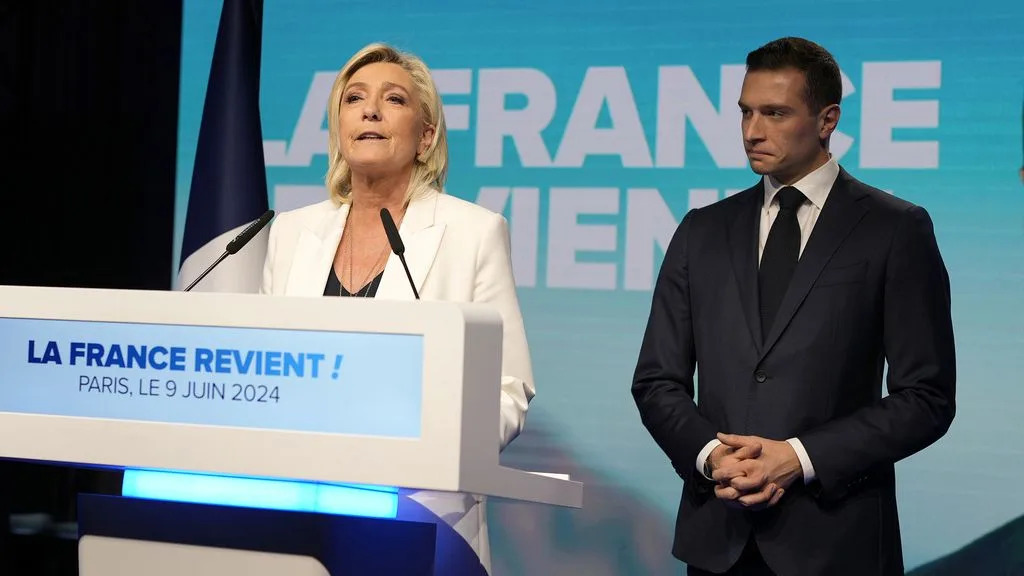
Marine Le Pen says Jordan Bardella will be prime minister if far right wins election
National Rally party president Jordan Bardella will be appointed prime minister if the far-right party wins the upcoming French parliamentary election, Marine Le Pen said.
The comments came on Monday night during a televised interview with the National Rally's leading figure on French commercial television network TF1.
“I’ve always told the French people that for months Bardella and I have been working as an executive couple in order to fulfil at best the duties invested in them by the French people,” Le Pen said.
“I think we have a historic opportunity to allow the National Rally to put France back on track.”
The conservative politician said her party would also consider joining forces with another right-wing candidate and get behind its candidate on election day, scheduled for 30 June and 7 July.
On Sunday, French President Emmanuel Macron announced he would dissolve the National Assembly and call for a snap election in the wake of disastrous results for his centrist Renaissance party in the European parliamentary elections.
The shock announcement came shortly after the far-right National Rally (NR) secured a whopping 30 of France’s 81 European Parliament seats and provisionally landed more than 30% of the French vote.
According to the latest estimates, Macron’s Renaissance party secured less than 15% of the vote — just ahead of the Socialists, whom the French president thought he had managed to obliterate from the political scene when he was first elected president in 2017.
The leftist France Unbowed party could finish in fourth place with around 10% of the vote, and the conservative Républicains about 7%.
Who is Bardella?
Bardella is the first person to lead the anti-immigration NR party who is not a member of the Le Pen family.
Born in 1995 in a Parisian suburb, the son of Italian immigrants has enjoyed a meteoric political career. At the 2024 European Union election, he secured twice as many votes as Macron's centrist alliance.
Influenced by the violent riots in the French suburbs in 2005, he entered politics at the age of 17, joining Marine Le Pen's far-right party NR party.
Tue, June 11, 2024

Marine Le Pen says Jordan Bardella will be prime minister if far right wins election
National Rally party president Jordan Bardella will be appointed prime minister if the far-right party wins the upcoming French parliamentary election, Marine Le Pen said.
The comments came on Monday night during a televised interview with the National Rally's leading figure on French commercial television network TF1.
“I’ve always told the French people that for months Bardella and I have been working as an executive couple in order to fulfil at best the duties invested in them by the French people,” Le Pen said.
“I think we have a historic opportunity to allow the National Rally to put France back on track.”
The conservative politician said her party would also consider joining forces with another right-wing candidate and get behind its candidate on election day, scheduled for 30 June and 7 July.
On Sunday, French President Emmanuel Macron announced he would dissolve the National Assembly and call for a snap election in the wake of disastrous results for his centrist Renaissance party in the European parliamentary elections.
The shock announcement came shortly after the far-right National Rally (NR) secured a whopping 30 of France’s 81 European Parliament seats and provisionally landed more than 30% of the French vote.
According to the latest estimates, Macron’s Renaissance party secured less than 15% of the vote — just ahead of the Socialists, whom the French president thought he had managed to obliterate from the political scene when he was first elected president in 2017.
The leftist France Unbowed party could finish in fourth place with around 10% of the vote, and the conservative Républicains about 7%.
Who is Bardella?
Bardella is the first person to lead the anti-immigration NR party who is not a member of the Le Pen family.
Born in 1995 in a Parisian suburb, the son of Italian immigrants has enjoyed a meteoric political career. At the 2024 European Union election, he secured twice as many votes as Macron's centrist alliance.
Influenced by the violent riots in the French suburbs in 2005, he entered politics at the age of 17, joining Marine Le Pen's far-right party NR party.

Jordan Bardella, president of the French far-right National Rally, is seen at the party election night headquarters on Sunday, June 9, 2024 in Paris, France. - AP
Two years later, he dropped out of a geography course to devote himself to politics and served consecutively as a regional councillor, spokesperson, and vice-president of the party. He then led NR’s list in the 2019 European elections at just 23 years old.
In November 2022, he was elected successor of Le Pen as the president of the far-right party. The following year, he was appointed, for the second consecutive time, as the party’s lead candidate — and is expected to remain at the helm for many years.
Bardella's meticulously crafted narrative has contributed to refining the image of the RN, a party once helmed by Jean-Marie Le Pen from a chateau nestled in an affluent suburb west of the capital.
In his own words, he uses TikTok — where he boasts more than a million followers — as a means "to reach out to young people who are depoliticised and become politicised through social media".
The NR's lead candidate for the EU elections, Bardella, campaigned to limit the free movement of migrants by carrying out national border controls and dialling back EU climate rules.
The party no longer wants to leave the EU and the eurozone but aims to weaken them from within. Accused in a television debate before the elections of bringing about the end of the EU, Bardella countered, "I am not against Europe. I am against the way Europe works."
Aiming for a significant powerbroking position in Europe following the elections, Bardella has distanced his party from the German ally Alternative for Germany (AfD), declaring that it will no longer align with the faction in the European Parliament after a series of controversies.
French right uproar over call for far-right alliance
Paul Kirby - BBC News
Tue, June 11, 2024

[REUTERS/Sarah Meyssonnier]
The leader of France's right-wing Republicans party, Eric Ciotti, has sparked an outcry after he backed an alliance with the far-right National Rally in snap elections announced by President Emmanuel Macron.
The anti-immigration party of Marine Le Pen and Jordan Bardella scored a dramatic victory in European elections on Sunday, prompting Mr Macron to dissolve parliament and call a first round of elections in 19 days' time.
The decision has sent shockwaves through French politics, not least among the Republicans party, which won only 7.25% of the vote and has seen many of its voters move to National Rally (RN).
For Republicans leader Eric Ciotti the solution was clear: "We need to have an alliance while remaining ourselves... an alliance with the National Rally and its candidates."
The snap election has prompted parties on both left and right to consider forming alliances to stand a greater chance of winning more seats. Left-wing parties have already agreed to abandon their differences to form a "popular front".
But never before has the traditional right in French politics made any sort of political accord with the far right and Mr Ciotti's remarks set a party that was already struggling to find a voice "on the verge of implosion", as Le Monde put it.
Mr Ciotti, who is on the right wing of his party, revealed he had already spoken to Marine Le Pen and Jordan Bardella. Ms Le Pen immediately praised his "courageous choice and sense of responsibility" and looked forward to an end to "40 years of a pseudo-cordon sanitaire" disappearing.
But his suggestion was immediately greeted with a chorus of derision. Outside party headquarters in Paris, supporters spoke of an act of treachery for a party whose origins lie with the first president of France's current Fifth Republic, Charles de Gaulle.
A clearly furious Republicans vice-president Florence Portelli said the party would fire Mr Ciotti for suggesting an accord with the far right. "I think there's a chance he can be made to leave, if he doesn't go by himself, and I have no doubt it'll happen," she told France Info TV.

Marine Le Pen and Jordan Bardella say they are ready to exercise power [ REUTERS/Sarah Meyssonnier]
Senate Republicans leader Bruno Retailleau accused him of disloyalty: "The Republicans will never form an alliance with the RN, we have deep ideological differences and we have to maintain our independence and integrity."
Many of Mr Ciotti's critics said he was driven by local politics in his home city of Nice. One MP, Vincent Descœur, said he was resigning in protest and another, Jean-Yves Bony, said he would too if Mr Ciotti didn't step down in 48 hours.
François-Xavier Bellamy, who led the Republicans in the European elections, said working with RN would merely be doing Mr Macron's work for him.
President Macron has explained his bombshell decision to call elections, saying he could not carry on after the European elections as if nothing had happened and did not want to come across as powerless.

[REUTERS/Hannah McKay/Pool]
He ruled out resigning as president "whatever the result" of the elections, which take place over two rounds on 30 June and 7 July, less than three weeks before the Paris Olympics.
"It's not the RN who write the constitution, or the spirit of it," he told Le Figaro.
National Rally won 31.4% of the vote on Sunday, more than double the 14.6% of Mr Macron's Renew alliance, while a resurgent centre left, led by Raphaël Glucksmann, reached 13.8%.
Another far-right party, Reconquest, took 5% of the vote, and there had been talk of the two parties forming an alliance for the next election.
But Marion Maréchal of Reconquest, who is Marine Le Pen's niece, said RN had decided against an alliance because they wanted nothing to do with her party's leader Eric Zemmour.
Macron snap election leaves rivals stunned after EU vote
Europe's night of election drama capped by Macron bombshell
Macron takes huge risk with surprise election
At the last parliamentary election, France's notoriously divided left-wing parties formed a group called Nupes, bringing together the Socialists, far-left France Unbowed (LF), Communists and Greens.
Despite Nupes imploding amid even wider divisions over issues such as the war in Gaza, the left parties have agreed to form a pact to fight the new elections.
Although Mr Macron won a second term two years ago, his party failed to secure a majority in parliament, making it a struggle to pass legislation.
He has often had to rely on support from the Republicans to do so, so his decision to call elections is a big risk, especially when he is facing defeat.
The first opinion poll taken since Sunday's elections suggests National Rally would win 34% of the vote, ahead of 19% for Mr Macron's party.
But until now the two rounds of a parliamentary election have been tricky for National Rally as they have often struggled to win more than 50% of second-round run-off votes because their opponents tend to coalesce against the far right.
It is so far unclear whether their dramatic success on Sunday may have changed that.
Le Pen and Bardella: France's far-right double act zero in on power
Gabriel Stargardter
Mon, June 10, 2024


Bardella speaks after the polls closed during the European Parliament elections, in Paris
By Gabriel Stargardter
PARIS (Reuters) - In a glossy video released days before the European Parliament elections, France's far-right double act appeared side by side in brilliant white shirts to deliver their final address.
"Do your patriotic duty," said Marine Le Pen, the leading figure of the National Rally (RN) party and de facto frontrunner for the 2027 presidential election. "I ask you to go to vote for Jordan Bardella. Offer France the most beautiful victory."
The video has notched nearly 5 million views since it was posted on Bardella's wildly popular TikTok account two days ago. It's part of a slick political rebrand, overseen by Le Pen and her 28-year-old party president Bardella, that has allowed the RN to shed its racist reputation as the former National Front, and storm to victory in Sunday's vote.
The RN's strong showing, which forced Macron into calling a snap legislative election that could finally hand the far right real power in France, is partly due to the formidable political tag team that Bardella and Le Pen have formed, experts said. They have fused youthful enthusiasm with battle-hardened experience to devastating electoral effect.
"They're very complementary," said Philippe Marliere, a French politics professor at University College London.
The sharp-suited Bardella, son of an Italian immigrant mother who grew up in the rough outskirts of Paris, has polished the RN's reputation, Marliere said. Bardella also broadened its appeal by attracting younger, blue-collar voters hit by inflation and job insecurity to a party once known for an older, middle-class and arch-conservative clientele, he added.
The RN won in every major age group in Sunday's election, except among the over-65s, where it was tied with Macron's ticket, according to a BFM TV exit poll.
Overall, the RN won 31.37% of the vote, the official tally showed, more than double the Macron coalition's 14.6%.
Emile Chabal, professor of contemporary history at the University of Edinburgh, said Bardella and Le Pen had detoxified the RN by retooling it as the party of the working class.
"While they have retained many aspects of the party's DNA - especially its anti-immigration policies and a hostility to Islam - they have managed to wrap these up in a protectionist language ... (that) appeals particularly to a younger middle-aged demographic," he said. "In 2024, the RN can fairly lay claim to being the party of the French working classes."
Bardella will be the party's candidate for prime minister in the upcoming early election to be held on June 30 and July 7, RN deputy chairman Sebastien Chenu said on RTL Radio on Monday.
On his TikTok account, where he has 1.5 million followers, Bardella often posts videos of himself with adoring young fans. In acerbic TV appearances, he has distinguished himself as Le Pen's clean-cut attack dog, Marliere said.
"It's a convenient arrangement for political purposes to let Marine Le Pen fully concentrate on the big prize, the (2027) presidential election," he said.
However, alongside his pugnacious media presence, Bardella has often let himself down with unforced errors and gaps on the nitty gritty of policy, Marliere said. Le Pen might fret that as prime minister, Bardella's inexperience could lead to charges of incompetence, potentially dooming her 2027 chances, he added.
And even before the snap vote, Bardella is likely to face a grilling on issues outside his comfort zone, especially on economic policy and Ukraine, a source close to Macron said.
"For legislative elections, he will be more exposed," the source said. "He will be asked: Who do you name for finance minister? What do you do for your first 100 days?"
Alternatively, if Bardella shines, Le Pen, 55, may fear being eclipsed by her young protege.
"If he looks more appealing or successful, there might be attempts to make him the 2027 presidential candidate," said Sudhir Hazareesingh, a French politics expert at Oxford University, especially as Le Pen has already lost three presidential elections, two of them to Macron.
"But Bardella is still very young so he can afford to wait a little, and let her fail rather than look too ambitious."
(Reporting by Gabriel Stargardter; additional reporting by Michel Rose; editing by Mark Heinrich)
National Rally to woo other right-wingers ahead of French snap poll
DPA
Mon, June 10, 2024

French far-right Rassemblement National (RN) party president Jordan Bardella smiles as he addresses militants after the first results announcement during an evening gathering of French far-right party Rassemblement National (RN) on the final day of the European Parliament election, at the Pavillon Chesnaie du Roy in Paris. Julien De Rosa/AFP/dpa
Following its win in the European elections, France's right-wing populist National Rally (RN) wants to woo other right-wingers, including from the far-right Reconquest party, for the snap parliamentary elections called by President Emmanuel Macron.
"I myself am perfectly willing to discuss with personalities who do not come from the National Rally and who share the ambition to bring some of our ideas to power in a few weeks and - also within the framework of a cohabitation - to initiate the reconstruction of the country," RN party leader Jordan Bardella said on Monday evening in Paris.
In France, cohabitation means that the president and the prime minister represent different political directions.
Bardella had his first meeting on Monday with Reconquest's lead candidate for the European elections, Marion Maréchal.
"I wanted to have a chat with her and talk about our current endeavours to form the broadest possible majority," Bardella said, adding that his party wanted to run with other right-wing parties as a national union in the parliamentary elections with the aim of taking over the government and the office of prime minister.
No agreements have yet been reached with Maréchal, he said: "At the moment, it's all about discussions."
National Rally received 31.36% of the vote in the European elections, while Reconquest achieved 5.47%.
Maréchal is the niece of National Rally's parliamentary party leader Marine Le Pen and used to be active in her party before switching to the far-right rival party a good two years ago.
"It seems obvious to me that the 1 million voters of Reconquest must participate in this momentum around the RN," Maréchal said after an initial discussion with Bardella and her aunt.
National Rally would like "to work with those in Reconquest who have taken a constructive stance towards the RN."
Reconquest leader Éric Zemmour, who is at loggerheads with National Rally, could be an obstacle to a right-wing alliance. French media are also speculating about a return of Maréchal to National Rally.
France goes into election campaign mode
France swiftly entered election campaign mode within 24 hours of the stunning electoral victory for National Rally.
President Emmanuel Macron dissolved the National Assembly, France's lower house of parliament, on Sunday after the scope of the far-right victory became clear and and scheduled parliamentary elections in just a few weeks' time.
Various parties are strategizing their campaigns in response to the sudden electoral call.
Macron's job as president is not at stake in the upcoming elections, as the next presidential election is not scheduled until 2027.
Government under pressure for a long time
His aim is to create a more stable majority in parliament for his remaining term of office. He will be hoping that citizens in France will not vote the same way in national elections as they did in the European Parliament elections, and that the snap election will break Le Pen's momentum.
While Macron enjoys a prominent role on the international stage, his governing camp has been struggling domestically for two years as his faction has not had an absolute majority in the National Assembly.
This has forced his camp to navigate a contentious and combative legislative environment, often resorting to heavy-handed tactics and bypassing votes in order to implement their plans.
The threat of a vote of no confidence this autumn has loomed over the government for some time, adding to the challenges of governing.
Consequences for Germany and Europe
Macron's snap election call is a big gamble. If it fails, it could have serious repercussions for Germany and Europe. Observers say the French president could lose substantial influence, making it difficult for him to advance his foreign policy agenda.
France could descend into a chaotic domestic political situation, compromising its reliability as an international partner.
However, if Macron manages to secure a more stable majority, it would benefit international partners as he would no longer be preoccupied with quelling domestic political unrest.
This marks the first dissolution of the French National Assembly in over 25 years, a significant move in France's recent political history.
EU vote results as catalyst for snap polls
National Rally secured 31.36% of the European vote, according to preliminary results announced by the Interior Ministry on Monday after all the votes had been counted.
Macron's camp came a distant second with 14.6%, followed by the Socialists with 13.83%.
The eurosceptic National Rally - which used to be called the National Front until six years ago - has softened its image in recent years in an effort to widen its appeal and strengthen Le Pen's bid for the presidency.

French far-right Rassemblement National (RN) party president Jordan Bardella addresses militants after the first results announcement during an evening gathering of French far-right party Rassemblement National (RN) on the final day of the European Parliament election, at the Pavillon Chesnaie du Roy in Paris. Julien De
France’s Macron bets big and stares down the far right
Joseph Ataman and Saskya Vandoorne, CNN
Mon, June 10, 2024
It was a stinging blow and a shocking parry.
French President Emmanuel Macron saw his party fall into second place in European Parliament elections in France on Sunday, with the two main far-right parties together taking close to 40% of the vote.
When Jordan Bardella, the leader of the far-right National Rally party, called on Macron to dissolve the French national parliament on Sunday night, it seemed like political posturing, riding high on his victory in European polls.
“The President of the Republic cannot remain deaf to the message sent by the French this evening,” he told supporters.
Macron called his bluff.
Announcing a snap national election for the end of June, Macron has set up a showdown between his pro-European, centrist and pro-Ukrainian ideals and the anti-immigration, populist and hard-line law-and-order rhetoric of the far right.
“The extreme right is both the impoverishment of the French and the downgrading of our country. So, at the end of this day, I cannot act as if nothing had happened,” he told the country in a televised address Sunday.
Calling the far right’s bluff
Macron will try to rally the right and left, urging their supporters to come together and vote against the far right, but there’s no knowing if it’ll pay off.
The first round of voting will take place in 20 days, a tiny window in which to form a coalition from the mosaic of France’s centrist and left-wing parties.
There appears to be little appetite to join forces with Macron on the left, bruised after years of largely fruitless protests against his pro-business agenda, and torn apart from the inside by divisions over the war in Gaza.
The last time a French president dissolved the country’s lower house, the National Assembly, was in 1997. Jacques Chirac lost his majority, and the left came to power.
In an interview Monday morning, French Foreign Minister Stephane Séjourné said that Macron’s Renaissance party was open to withholding candidates from contesting the seats of potential allies in other parties.
Séjourné told Radio France that the party would discuss such a move with “reasonable people with whom we can work.”
On Sunday night, the popular French far-left party France Unbowed (LFI) appeared to have already ruled itself out of such a move.
“It is now clear that the country wants to turn the page on the Macron era. And this page must not be turned with the National Rally and the far right,” Manon Aubry, leader of the LFI European list, which came fourth in the European vote in France, told supporters.
LFI figurehead Jean-Luc Mélenchon said that he saw no reason to unite with other parties on the left, especially with the narrow window to form a coalition.
Such a proposition by Macron’s party is no doubt a sign of weakness, a far cry from Macron’s 2017 landslide second-round victory over far-right presidential candidate Marine Le Pen – and a sign of the times, his party wounded by memories of the “yellow vest” protests, an unyielding Covid-19 regime, and unpopular pension reforms.
Since parliamentary elections held at the beginning of his second term in 2022, Macron has been ruling without an absolute majority in parliament, ordinarily unable to pass bills with his lawmakers alone.
Instead, he invoked article 49.3 of the constitution several times to push legislation through parliament without a vote.
This has stoked yet more anger against Macron and further division in France, especially given the contentious nature of his hike in the pension age to 64.

French far-right leader Marine Le Pen arrives at the National Rally party headquarters on Monday, June 10, 2024 in Paris. - Thomas Padilla/AP
Dueling visions
The far-right National Rally, spearheaded by Le Pen, the long-time doyenne of France’s anti-immigration camp, currently holds 88 to Macron’s bloc’s 250 seats in the 577-seat French parliament and, in theory, the upcoming election is far from a two-horse race.
The appeal of the far-right’s anti-immigration stance is no doubt magnified on the European stage – where EU lawmakers have long struggled to stem illegal immigration flows.
At a national level, Bardella and Le Pen will have to rely on a broader spectrum of policies, doing battle with Macron’s economic record, which has mostly shielded France from the inflation woes suffered by Europe.
However, it’s clear that this election will be a duel between Macron and Le Pen.
French Finance Minister Bruno Le Maire admitted Monday morning that his party held some responsibility for Sunday’s results. He made his objective for the campaign clear.
“This will be project against project; National Rally against ours,” he told French radio network RTL.
The French foreign minister described the call for elections as a “bet of confidence” in the French people by Macron, with the president trusting they will hold the line against political extremes.
France’s voting system plays in Macron’s favor.
In the first round of ballots, a variety of parties will compete to meet a minimum threshold of votes.
The second round on July 7 will see the highest-polling candidates in each seat run off if no one wins an absolute majority. This could see voters of different stripes banding together to oppose a candidate from the far right.
This mechanism also applies to the presidential election, which has ensured no far-right victory at the Elysee Palace thus far.
On a more local scale, it may not be such a security.
Ultimately, the June 30 and July 7 votes will determine how Macron spends his last three years in power.

France's President Emmanuel Macron is seen before casting his ballot for the European Parliament election at a polling station in Le Touquet, northern France, on June 9, 2024. - Hannah McKay/Pool/AFP/Getty Images
What comes next?
What’s certain is that Macron – with a presidential mandate until 2027 - will remain president no matter what.
If his gamble pays off and he wins back a majority in parliament, he’ll be able to move ahead with reforms and govern as he likes: changes to end-of-life care and the education system are in his crosshairs. It’ll give him precious breathing space and a clear mandate for his agenda at home and abroad. In his words, “It’s a time of indispensable clarification.”
“The rise of nationalists and demagogues is a danger not only for our nation, but also for our Europe and for France’s place in Europe and the world,” Macron said Sunday in his address to the nation.
But the prospect of a lame-duck presidency looms large.
If his bloc, currently with 250 of the 577 MPs in the National Assembly, fails to meet the 289-seat threshold for an absolute majority but remains the largest, his government will again have to wage legislative battle with one hand tied behind its back.
If his nightmare comes true and the far-right movement replicates its European results on the national stage, he will be forced to appoint a prime minister from its ranks – most likely the 28-year-old Bardella, current president of National Rally.
In a “cohabitation,” Macron would deal with international and defense issues, while Bardella would hold sway over the domestic agenda.
Party figurehead Le Pen would likely wait in the wings to contest the 2027 president election against Macron’s successor. The constitution prevents him running for a third term.
“We are ready to be in power,” she said in her Sunday night victory speech.
In a country increasingly polarized by populist rhetoric, Yaël Braun-Pivet, speaker of France’s National Assembly struck a lonely note Monday morning as she called for greater cross-party cooperation.
“In France we don’t manage to get past partisan quarrels,” she said in an interview with broadcaster France 2.
Macron’s reputation has been founded on bold, political moves.
But if he fails to hold back the far-right this month in the coming weeks, his legacy will be the gamble that let the far right into power.
Macron’s snap election ‘sets a trap for Le Pen’
Henry Samuel
TELEGRAPH
Mon, June 10, 2024
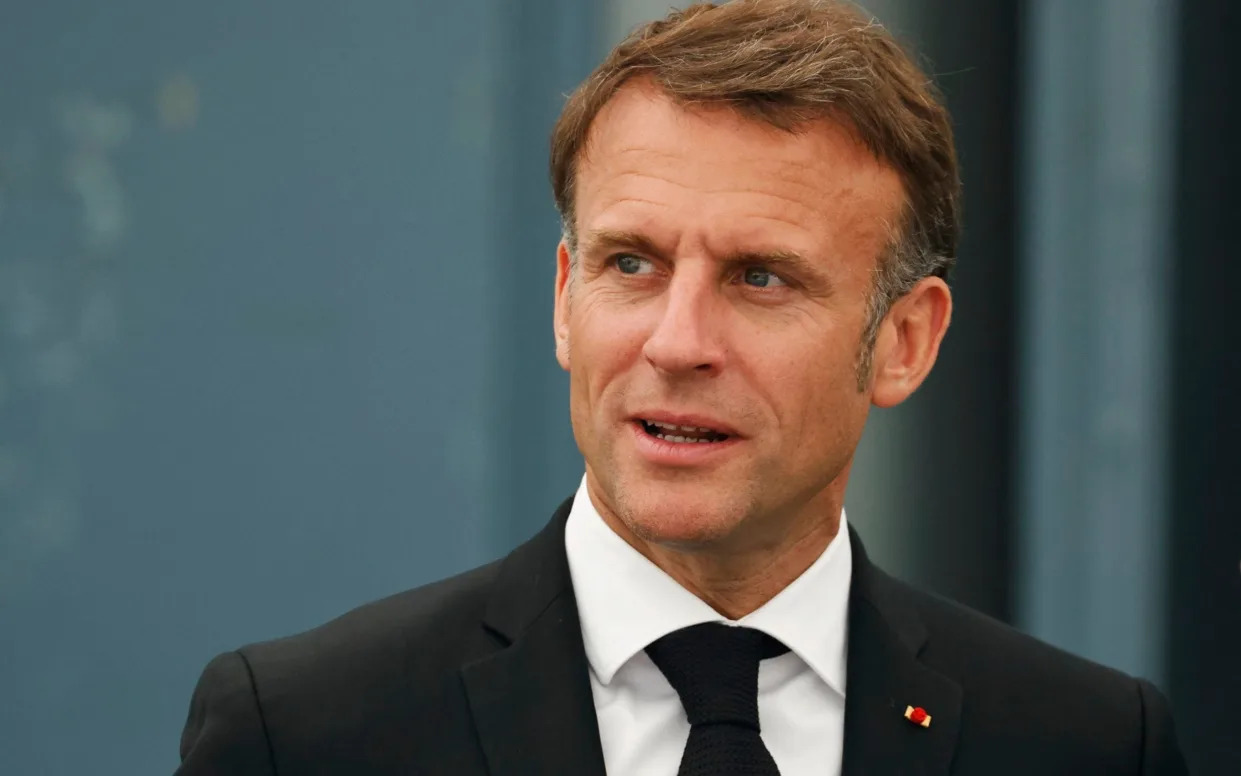
Emmanuel Macron's power has been curtailed since he lost his absolute majority in parliament two years ago - LUDOVIC MARIN/AFP
Emmanuel Macron has laid a trap for the hard-Right by calling a surprise parliamentary election, Elysee sources said.
Government officials suggested Mr Macron was allowing Marine Le Pen’s Rassemblement National (RN) to win control of the French parliament to expose her incompetence ahead of a presidential election.
Emmanuel Pellerin, of Mr Macron’s Renaissance party, added: “Everything points to the [hard-Right RN] winning a relative or absolute majority. But that forces the French to think about what is at stake.”
However, one MP from Mr Macron’s party said “we’re still in shock” over the snap election call.
Mon, June 10, 2024

Emmanuel Macron's power has been curtailed since he lost his absolute majority in parliament two years ago - LUDOVIC MARIN/AFP
Emmanuel Macron has laid a trap for the hard-Right by calling a surprise parliamentary election, Elysee sources said.
Government officials suggested Mr Macron was allowing Marine Le Pen’s Rassemblement National (RN) to win control of the French parliament to expose her incompetence ahead of a presidential election.
Emmanuel Pellerin, of Mr Macron’s Renaissance party, added: “Everything points to the [hard-Right RN] winning a relative or absolute majority. But that forces the French to think about what is at stake.”
However, one MP from Mr Macron’s party said “we’re still in shock” over the snap election call.
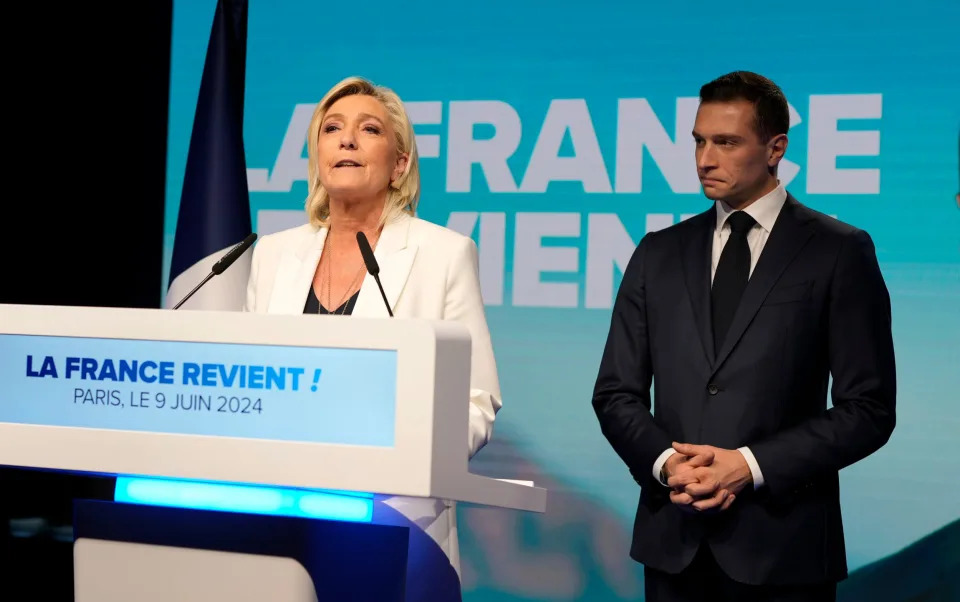
Marine Le Pen pictured alongside Jordan Bardella, president of the French far-right National Rally - LEWIS JOLY/AP
An Élysée source told Reuters that the 46-year-old French president, whose power has been curtailed since he lost his absolute majority in parliament two years ago, calculated that there was a chance he could claw back a majority, taking everyone by surprise – including many in his own camp.
But even if this fails and the RN secures a parliamentary majority, his gamble is that three years of populism would unmask her party’s incompetence to voters and undermine her bid for the presidency in 2027, said the source.
Her party has already let it be known that Jordan Bardella, 28, who ran RN’s European election campaign and won 31.5 per cent of the vote – more than twice that of Macron’s party – would become prime minister should the party secure a majority next month.
“I knew this option was on the table, but when it becomes reality it’s something else ... I didn’t sleep last night,” said the source.
President Macron said on Monday that he was “confident” the French would “make the right choice for themselves and for future generations”.
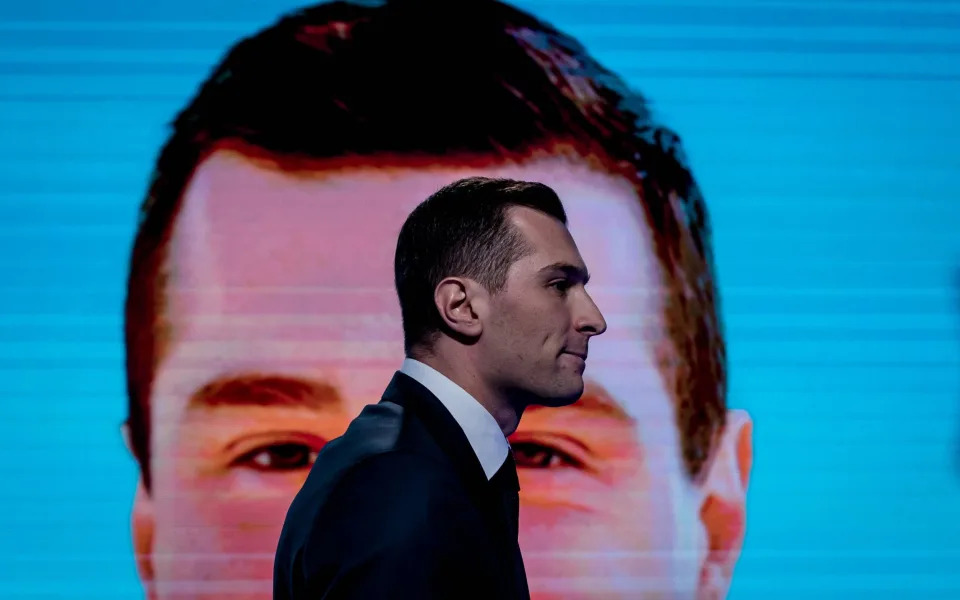
Jordan Bardella will become prime minister if Marine Le Pen's party triumphs in the elections - CHANG MARTIN/SIPA/SHUTTERSTOCK
His surprise move came after mainstream centrist parties kept an overall majority in the European Parliament in Sunday’s elections, but the hard-Right also notched up a string of high-profile victories in Italy and Austria.
It came second in the Netherlands and Germany, where the three governing coalition parties also tanked. However, centre-Left Chancellor Olaf Scholz’s spokesman ruled out a snap vote in Germany.
Some commentators are calling Mr Macron’s move rash or even political suicide prompted by hubris and a sense of “après moi, le déluge”.
The prospect that France will have a populist Right-wing prime minister when it stages the Olympics this summer is now real. Paris mayor Anne Hidalgo, a Socialist, described the prospect of elections just weeks before the start of the Paris Games as “extremely unsettling”.
“By playing with fire, the head of state could end up … burning himself and dragging the entire country into the fire,” Le Monde wrote in an editorial.
But Mr Macron appeared unfazed as he visited the site of a Second World War massacre by Nazi soldiers together with Frank-Walter Steinmeier, the German president.
Mr Steinmeier said: “Let us never forget the damage done in Europe by nationalism and hate.”
Back in Paris, even some allies expressed shock and dissent.
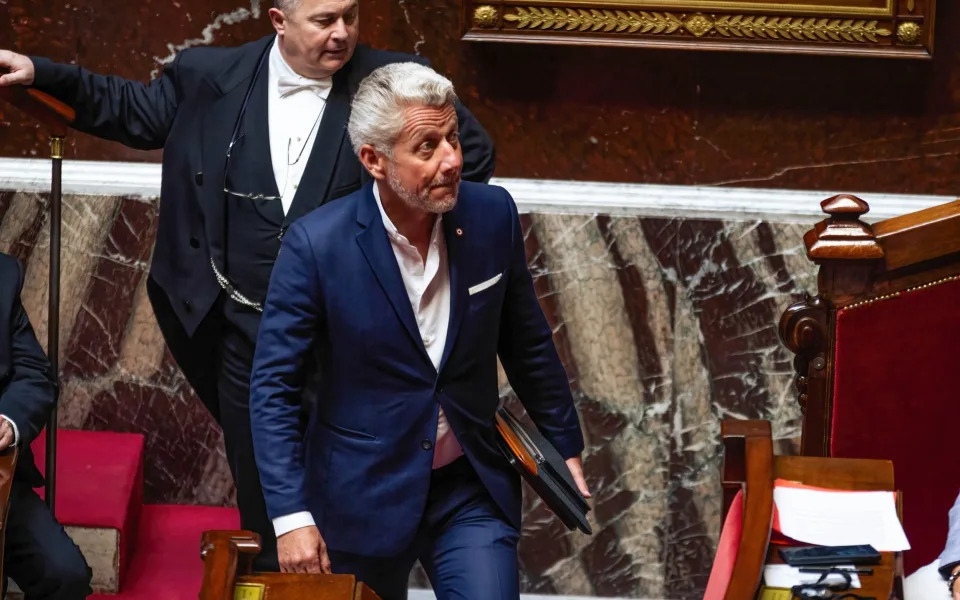
Emmanuel Pellerin, of Macron's Renaissance party, said 'everything pointed to a National Rally victory in parliamentary elections' - TELMO PINTO/SOPA IMAGES/SHUTTERSTOCK
Lower house speaker Yaël Braun-Pivet, a senior figure within Macron’s party, indicated that forming a coalition with other parties could have been a better “path”.
“The president believed that this path did not exist,” she told television channel France 2.
Even Gabriel Attal, his loyal prime minister, who was kept in the dark until the last minute, tried to talk him out of it, tendering his own resignation.
“Use me as the fuse,” he reportedly urged his 46-year-old boss, offering himself as a sacrificial lamb following the heavy defeat.
Mr Macron reportedly declined and told the popular 35-year-old that he was “the best person” to front the legislative campaign against the equally popular Mr Bardella.
“It is better to write history than to endure it,” he reportedly told the stunned cabinet. No one dared to contradict him.
A poll discreetly conducted by the conservative Republicans party late last year suggested Rassemblement National (RN) would win the most seats in parliament – between 243 and 305, compared with 89 at present. It would require 289 seats for a majority.
The Kremlin, which hopes the far Right will take a softer line on Russia over its invasion of Ukraine, said it was “attentively observing” the gains across Europe.
Despite these, Ursula von der Leyen, 65, the European Commission president, insisted that “the centre held” overall in the elections that saw her centre-Right European People’s Party (EPP) strengthen its grip on first place in the European Parliament.
“There is still a majority for a strong Europe in the middle of the political spectrum,” said Ms von der Leyen, who hopes to secure a second term, adding: “Together we will form a bastion against the extremes of the Left and the Right.”
A US official said it did not expect any major foreign policy changes from the EU, including on Ukraine, after the vote.
No comments:
Post a Comment